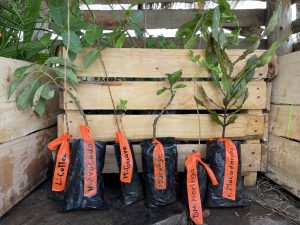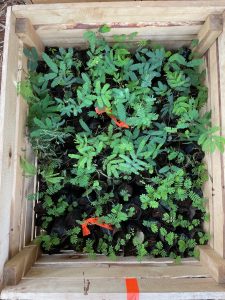 Lake Albert Foundation believes in developing solutions and projects together with its recipients, instead of only for them. Having worked in the West-Nile region in Uganda for years, Lake Albert Foundation has a good relationship with local government, companies and communities. With them, we discussed the challenges they face and the type of solution they need. It emerged that deforestation is causing the land to become drier, leading to a decline in soil quality and, consequently, decreased food production. Many people recognise that planting trees is a crucial solution, but the seedlings of indigenous and/or lucrative species are too expensive as they need to be sourced from afar. With this information, the Lake Albert Foundation, in collaboration with Kilimo Kisasa, hassought a solution. Establishing a local tree nursery with its own composting system emerged as a highly promising option.
This is why the Lake Albert Foundation, with support from Stichting de Hoorn, is setting up a tree nursery in Zombo district. This nursery will make at least 15 productive and indigenous trees available to the local community. This way, planting trees will become more realistic and maintenance easier, since customers will receive information on planting
Lake Albert Foundation believes in developing solutions and projects together with its recipients, instead of only for them. Having worked in the West-Nile region in Uganda for years, Lake Albert Foundation has a good relationship with local government, companies and communities. With them, we discussed the challenges they face and the type of solution they need. It emerged that deforestation is causing the land to become drier, leading to a decline in soil quality and, consequently, decreased food production. Many people recognise that planting trees is a crucial solution, but the seedlings of indigenous and/or lucrative species are too expensive as they need to be sourced from afar. With this information, the Lake Albert Foundation, in collaboration with Kilimo Kisasa, hassought a solution. Establishing a local tree nursery with its own composting system emerged as a highly promising option.
This is why the Lake Albert Foundation, with support from Stichting de Hoorn, is setting up a tree nursery in Zombo district. This nursery will make at least 15 productive and indigenous trees available to the local community. This way, planting trees will become more realistic and maintenance easier, since customers will receive information on planting and maintenance with every tree they buy.
The construction of the tree nursery fits in the strategy to reverse the trend of food insecurity and deforestation that are constantly reinforcing each other. To make this reverse, there is a significant need for innovative ways to establish sustainable food systems that combine biodiversity and soil condition restoration with sustainable food production. An essential aspect of this is the reforestation of (indigenous) trees, offering various benefits such aserosion control, income from forest products, improved soil quality (structure and nutrients), revenue from carbon credits, climate mitigation and adaptation, and more.
and maintenance with every tree they buy.
The construction of the tree nursery fits in the strategy to reverse the trend of food insecurity and deforestation that are constantly reinforcing each other. To make this reverse, there is a significant need for innovative ways to establish sustainable food systems that combine biodiversity and soil condition restoration with sustainable food production. An essential aspect of this is the reforestation of (indigenous) trees, offering various benefits such aserosion control, income from forest products, improved soil quality (structure and nutrients), revenue from carbon credits, climate mitigation and adaptation, and more.
